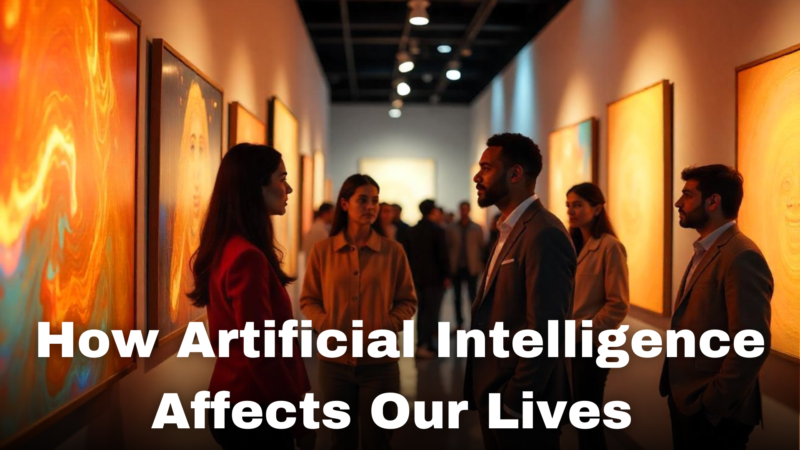How Artificial Intelligence Affects Our Lives

How Artificial Intelligence Affects Our Lives
Artificial Intelligence is increasingly affecting our way of living, working, and interacting with technology. Its influence is being rapidly accelerated, from the simple automation of day-to-day tasks to total transformations in industries. These are some key areas through which AI has contributed to our lives:
1. Automations Via Personal Assistants
One of the most palpable manifestations of AI in daily life is via the virtual personal assistants Siri, Alexa, and Google Assistant. These AI-powered assistants assist users in performing tasks, answering questions, controlling smart home devices, and keeping one entertained. AI help automates tedious activities and makes life more comfortable. In the workplace, AI automating tasks means a streamlined process whereby tasks such as data entry, scheduling, and customer service are left to machines. Employees will thus have room for higher-level problem-solving.
2. Advances in Healthcare
AI has made remarkable contributions to the field of healthcare, especially in diagnosis, personalized medicine, and treatment planning. AI tools like IBM’s Watson Health can assess large data sets on patients for patterns that a doctor may miss; hence, these improve early diagnosis for diseases such as cancer. Besides, machine learning models help to predict patient outcomes, optimize treatment plans, and facilitate assessments using medical images. AI is leveraged in robotic surgery and wearables, to ensure precision and capture real-time health metrics, thus granting patients greater control over their health.
3. Transportation and Safety
At the heart of self-driving cars and autonomous vehicles, AI represents the beginning of a revolution in the future of transportation. It is AI-powered systems, like those of Tesla with drivers’ function-aided systems-so that cars can decode, avoid obstacles, and minimize human error. This is likely to transform greatly the safety of the roads, resulting in fewer accidents and in an almost negligible way easing traffic. AI has also started making uses in air traffic control, logistics, and public transport systems; to enhance efficiency and lessen the impacts of climate change.
4. Retail & e-Commerce
The retail and e-commerce sector has witnessed a heavy dose of AI interference in personalized recommendations and the design of customer service chatbots. AI is analyzing consumer behavior and shopping patterns to provide customized product suggestions to create a better experience. For example, it assists platforms like Amazon in optimizing their inventory management and suggesting products that could be of interest to users. Moreover, Chatbots in online shopping environments resolve customer inquiries, arguably improving sales within the customer service unit of their stores.
5. Education
AI is personalizing education and making it widely accessible. Adaptive learning platforms-Nor for Knew ton and Duolingo-tailor lessons to suit their own pace and learning style. AI tools can track students’ progress and find areas where they need to improve, offering exercises to strengthen their knowledge. AI grading systems and administrative tasks also minimize the workload on teachers. Such systems free them to focus solely on engaging students.
6. Entertainment and Media
The role of AI growingly decides how the entertainment industry is structured, especially the part of content recommendation. Streaming platforms such as Netflix and YouTube, using AI algorithms, analyze viewing habits regarding shows, music, and videos to recommend them to user preferences. On that note, AI is also encouraging content creation, through music, art, and even screenwriting tools, pushing creative limits.
7. Challenges and Ethical Considerations
While AI has its advantages, ethical issues accompanied them. Data privacy is foremost an issue since AI’s effective functioning requires a lot of personal information. The possibility of algorithmic bias is another challenge-faulty information which may propagate unfair discrimination in employment, policing, and loans. There is the question of job losses-in some sectors, careers may be displaced, which may invite the requisite attention of policymakers to devise reskilling programs.
Conclusion
AI has already started to change our lives, weaving them better, quicker, and more efficient. Be it healthcare or entertainment, it is not within our capacity to deny, even so, we face new challenges regarding ethics and liberties and working. As AI progresses further, such impact will only become deeper in unexpected ways, and in order to navigate along with this new-blooming landscape of all-out technology, some balance must be struck between innovation and responsible use.
Important Link
- How did Kris Kristofferson die
- How to sign in bank of America online
- Millie Bobby Brown and Jake Bongiovi: A Love Story for the Ages
- India Women vs South Africa Women Cricket Match 2024
- Is Iran attacking Israel
- What happened to John Amos
- How many leagues are there in sports
- What are sports leagues
- How many times India beat Bangladesh?
Disclaimer: chronobazaar.com is created only for the purpose of education and knowledge. For any queries, disclaimer is requested to kindly contact us. We assure you we will do our best. We do not support piracy. If in any way it violates the law or there is any problem, please mail us on chronobazaar2.0@gmail.com
